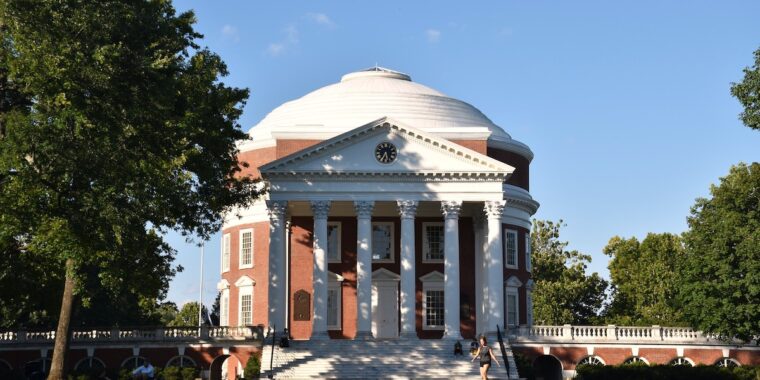
As part of the Uncommon Grounds speaker series hosted by the UVA Colonnade Club, adjunct professor of politics and public affairs and former speechwriter for George H. W. Bush, Mary Kate Cary highlighted the lack of free speech across college campuses in America and offered specific solutions for strengthening free speech at UVA on Thursday night.
Despite general agreement in American society that free speech is essential to a functioning democracy, this fundamental right is often not fully honored by many of our nation’s brightest and most promising institutions. Every year, the Foundation for Individual Rights and Expressions, also known as FIRE, ranks approximately 250 universities on their commitment to free speech on a scale from 0-100. Only four schools had the top ranking of “good.” Many of America’s most prestigious universities like Harvard, University of Pennsylvania, Georgetown, Northwestern, and Dartmouth ranked in the bottom ten in the free speech rankings. At such universities, speakers have been disinvited and students and scholars alike have been sanctioned for expressing beliefs deemed too controversial or offensive. FIRE even assigned six universities including Baylor, Liberty, and Pepperdine University a “warning” ranking for explicit prioritization of other values over freedom of speech.
There is reason for hope, as FIRE ranked UVA as the sixth best university for free speech, due to its protection of scholars, students, and speakers holding sensitive views on both ends of the political spectrum. But regardless of its high ranking, numerous UVA students contend that freedom of expression on Grounds should be further protected. In student surveys, many express that there is a widespread mentality of remaining uncontroversial and saying a specific thing to improve their grade in a class or appease the professor. Similarly, recent surveys conducted by FIRE report that above 80% of students self-censor to avoid offending their peers or professors. This mark is even higher at UVA.
To strengthen free speech and promote viewpoint diversity at UVA, Professor Mary Kate Cary proposed that free speech must be strengthened at the institutional, faculty, and student levels.
In 2014, The University of Chicago adopted a set of principles demonstrating a commitment to free speech and institutional neutrality. Since then, 84 universities have adopted similar commitments. If UVA were to follow suit, the university could hold itself accountable by protecting speakers and students espousing potentially contentious views. Additionally, to make students and faculty aware of their commitment to free speech, the University could promote its statement on free speech during new student orientations.
Similarly, faculty can play an integral role in student awareness of free speech. While the syllabi in UVA School of Law classes include a statement of free speech, the vast majority of undergraduate classes have no such statement. Professors reiterating the university’s commitment to protected speech would make students more comfortable in expressing their own views and would lead to more thoughtful, productive discussions. Furthermore, more faculty co-teaching can promote viewpoint diversity which is essential in academic environments. Professor Cary co-taught a class examining the 2020 election with Professor of politics and public policy, Jeniffer Lawless, who sought the Democratic nomination in Rhode Island for the House of Representatives. The course was a massive success; nine out of ten students who completed it wanted more courses at UVA to be taught by professors of opposing views. A similar proportion of students were motivated to become involved with politics in the future.
Regardless of what occurs at the institutional and faculty level, students must use their power and voice to promote free speech. The UVA student council and student organizations ought to include the University’s statement on free speech in their constitutions and websites. While challenging, all students would benefit if some take the initiative to share their authentic views in classroom discussions and conversations with peers.
Nevertheless, Professor Cary highlighted the many UVA students who have already created initiatives to support free expression and healthy disagreement. “Middle Grounds,” a student-run organization, is dedicated to promoting a healthy political culture at UVA by honoring differing perspectives and helping students find common ground on pressing issues. Two UVA students from the club recently started the “Bipodisan Podcast” in which listeners can hear arguments from opposite sides of the aisle. On October 18th, students can participate in UVA’s Annual Student Oratory Competition by delivering a short speech answering the question, “What is the greatest strength of our American democracy?” Contests like these allow students the opportunity to not only voice their own ideas and views but support them with evidence and logic.
While UVA is among the best universities in the country concerning freedom of speech, many students feel uneasy expressing their own ideas in the classrooms and find it difficult to have uncomfortable conversations with their peers. Fortunately, straightforward ideas like instituting more co-taught classes and including UVA’s statement of freedom of speech on course syllabi can strengthen the University’s commitment to freedom of expression, benefiting all students and faculty.


Leave a Reply